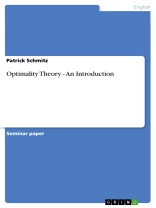Seminar paper from the year 2009 in the subject English Language and Literature Studies – Linguistics, grade: 2, 0, RWTH Aachen University, language: English, abstract: The linguistic model Optimality Theory was for the first time proposed by the linguist Alan Prince (Rutgers University, New Jersey) in cooperation with his colleague Paul Smolensky (John Hopkins University, Baltimore) in the year 1993. This representational model has – since then – been constantly expanded for instance owing to the work of John J. Mc Carthy (University of Massachusetts Amherst) and other scholars such as René Kager in the Netherlands or Caroline Féry in Germany. The studies conducted in this term paper are primarily based upon the work of the aforementioned scholars with a particular focus on the examinations by the three ‘fathers’ of Optimality Theory, viz. Prince, Smolensky and Mc Carthy. Another fact revealing that this model is a current and productive one – i.e. beside the spreading and development of Optimality Theory all over the linguistic world – is its applicability to different subfields of linguistics, namely phonology, syntax and morphology. With reference to its wide use, it should be said that this term paper predominantly examines the phonological applicability of this linguistic model. The theory itself borrows fundamental aspects from Generative Grammar such as the role of Universal Principles in language, which will be pointed out as one of the most important pillars of Optimality Theory in the course of this paper. In addition to explaining the fundamental principles and processes in Optimality Theory such as the roles of constraints and various other functions as for example GEN or EVAL in a general introduction (chapter 2), I will also report on two case-studies (chapter 3): one on Tagalog prefix infixation already examined by Prince and Smolensky and one on German Final Devoicing worked upon by Féry. The examination of these particular case-studies shall prove that Optimality Theory is helpful when it comes to scrutinizing certain grammatical phenomena either in well-known languages such as German or less known and used languages such as Tagalog, an Austronesian language spoken in the Philippines. Finally, I want to point out the advantages and disadvantages of this linguistic model by focussing on the set of the following questions: why do scholars employ the strategies of Optimality Theory and how do these strategies support linguists in coming to their respective results? What actually is Optimality Theory good for and in which respect does it prove inadequate for studying languages and grammatical systems?
Patrick Schmitz
Optimality Theory – An Introduction [EPUB ebook]
Optimality Theory – An Introduction [EPUB ebook]
Mua cuốn sách điện tử này và nhận thêm 1 cuốn MIỄN PHÍ!
Ngôn ngữ Anh ● định dạng EPUB ● Trang 44 ● ISBN 9783656150886 ● Kích thước tập tin 0.5 MB ● Nhà xuất bản GRIN Verlag ● Thành phố München ● Quốc gia DE ● Được phát hành 2012 ● Phiên bản 1 ● Có thể tải xuống 24 tháng ● Tiền tệ EUR ● TÔI 3946284 ● Sao chép bảo vệ không có












